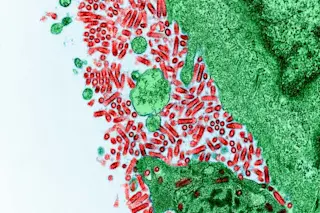Research with chimpanzee. Courtesy of Everett Collection / shutterstock Researchers have made strides in understanding human diseases such as Hepatitis C and HIV-Aids by using chimpanzees as test subjects. But public and institutional pushback has caused the U.S. National Institutes of Health (NIH) to rein in its chimpanzee research in recent years. A report [pdf] released by a NIH working group Tuesday calls for an even more drastic cut in the number of chimpanzees used for research as well as a reform of the way that research is conducted in the future. Chimpanzees are a valuable resource for medical research because they are the present-day species most closely related to humans. For the same reason, using chimps as test subjects brings up a whole crop of animal rights issues. The real question is if these animal studies are really necessary for medical research anymore. The National Institutes of Health are ...
NIH Plans to Retire Chimpanzees From Research
Chimpanzee research faces reevaluation as NIH considers retiring most research chimps amid rising animal rights concerns.
More on Discover
Stay Curious
SubscribeTo The Magazine
Save up to 40% off the cover price when you subscribe to Discover magazine.
Subscribe













